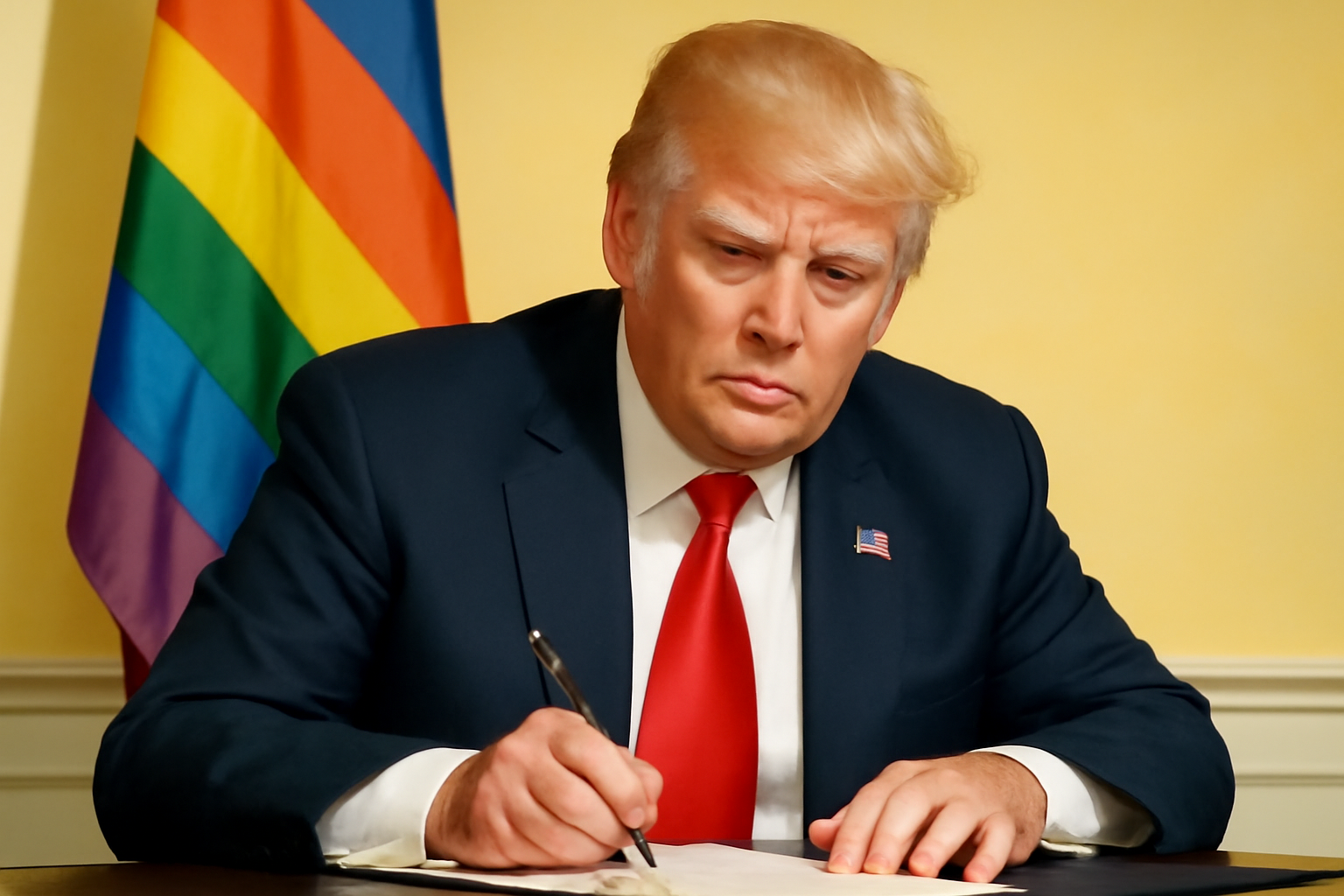
In a move that has sparked significant controversy, former President Donald Trump has signed an executive order aimed at penalizing educational institutions that address transgender topics. This directive, issued on Wednesday, January 29, has raised alarms among educators and advocacy groups alike due to its far-reaching implications on school curriculums across the United States.
The executive order mandates the acting education secretary to formulate a plan within 90 days to curb what it describes as "indoctrination" in schools. This initiative urges Denise Carter, the acting secretary, to condition federal funding on whether schools align their teaching with standards approved by the Trump administration. Critics argue that this could significantly alter educational content, steering it away from inclusive discussions on gender and identity.
"This initiative represents an unprecedented interference by the federal government in local education systems," said Jonathan Zimmerman, an education historian at the University of Pennsylvania. "The question of whether the federal government can influence curriculum in this way is completely open. If they succeed, it would mark the first time the federal government has compelled school districts to modify their curriculums at such a scale."
Trump’s executive order is the latest in a series of actions aimed at curtailing discussions of transgender issues in public life. The former president has repeatedly claimed that the U.S. educational system is overly influenced by what he describes as "transgender ideology." On the first day of his administration, Trump vowed to combat what he called "transgender lunacy," promising to remove transgender individuals from various public sectors.
LGBTQ+ advocacy groups have been quick to criticize the executive order. GLAAD, a prominent organization advocating for LGBTQ+ rights, has highlighted the potential negative impacts of such policies. "The Trump administration's continued focus on anti-transgender policies comes at a cost to all Americans," said a GLAAD spokesperson. "By spreading misinformation and fear, they divert attention from solving real issues and improving lives."
Implications for Schools and Students
The executive order raises significant questions about its potential impact on educational institutions and students. Many educators fear that the directive will restrict their ability to provide comprehensive and inclusive education. In recent years, there has been an increased focus on including diverse perspectives in school curriculums, allowing students to learn about different identities and experiences.
Last year, a non-binary and bisexual teacher addressed concerns about perceived LGBTQ+ "indoctrination" in classrooms. Through a widely shared video, they explained why such fears are unfounded and emphasized the importance of inclusive education for all students. "The introduction you’re afraid of isn’t real," the teacher stated, underscoring the misrepresentations often faced by LGBTQ+ educators.
This executive order, however, threatens to undermine progress made towards inclusivity. By tying federal funding to compliance with administration-approved teachings, schools may be pressured to shy away from essential discussions about gender and identity, depriving students of the opportunity to learn about the diverse world they inhabit.
Looking Forward
As the 90-day deadline approaches for the education secretary to submit a compliance plan, educators and advocacy groups are mobilizing to resist the executive order’s directives. Many argue that open, honest discussions about gender and identity are crucial for fostering understanding and acceptance among students of all backgrounds.
"Our schools should be safe spaces where every student feels seen and heard," said an advocate for inclusive education. "Policies that silence discussions about transgender issues not only harm transgender students but also deny all students the chance to engage with the full spectrum of human diversity."
The broader implications of this executive order remain to be seen, but it has undoubtedly ignited a passionate debate about the role of government in education and the rights of students to receive a comprehensive education.
As this situation evolves, it is crucial for supporters of inclusive education to remain vigilant and proactive in defending the rights of all students, regardless of gender identity. The coming months will be critical in determining how schools navigate these new challenges and continue to strive towards a more inclusive future for all.
We invite you to share your thoughts and continue the conversation in the comments below. As always, please keep discussions respectful and constructive.
Related Posts
Triumphant Trans Woman Wins Legal Battle and Inspires Others to Stand Up for Their Rights
Breaking new ground: a landmark victory in transgender rights After battling in courtrooms and enduring endless challenges, Diana Portillo, a transgender woman, has secured a monumental victory in her decade-long fight against workplace discrimination. The result? Nearly $1 million awarded in a historic settlement. But this isn't just a win on paper—it represents a powerful precedent in combati [...]
Pride Month in Latin America: Protests and Demands for Equality
**Celebrating Pride and advocating LGBTQ+ rights in Latin America** Pride Month in Latin America was a lively mix where celebration met activism. Communities united, not just throwing a party but making a stand—demanding equality and pushing governments toward better protection and rights recognition. Throughout Latin America, pride events erupted in marches and cultural displays, each with a c [...]
Transgender Erasure Actions Implemented by National Park Service
```html Trump administration's impact on national park service and transgender recognition The Trump administration made notable moves in undermining transgender representation, which included directing agencies like National Park Service not include "T" and "Q" when they refered “LGBTQ” in any official communication. This move seems part a broader plan by this administration aimed at reducin [...]